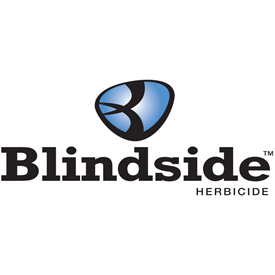Home > Weed Killers > Blindside Herbicide
Blindside Herbicide
Launch a surprise attack against even the toughest post-emergence weeds.

For Selective Weed Control in Turf IncludingResidential, Commercial and Institutional Lawns,Athletic Fields, Commercial Sod Farms, GolfCourses (Fairways and Roughs), and Other Noncrop Sites.
| Active Ingredient | % |
|---|
| Sulfentrazone | 60.00 % |
| Metsulfuron-methyl | 6.00 % |
| Other Ingredients | 34.00 % |
Label & SDS
Mode of Action
Lipid Synthesis Inhibitors, Amino Acid Systhesis Inhibitors
Site of Action
(1) ACCase Inhibitor, (2) ALS Inhibitor
Safe On
Click on a grass type below to see safe application rates:
Bermudagrass, Centipedegrass, St. Augustinegrass, Zoysiagrass, Kentucky Bluegrass, and Tall Fescue
Not Safe On
No not safe on treatments listed. Please, review the label or contact the merchant for more information.
Maximum Yearly Limits
Consult your state Pesticide Control Agency for additional informationregarding the maximum use rates.
Before Seeding Instructions
Reseeding, overseeding or sprigging of treated areas within one (1)month after application of this product could inhibit the establishment ofdesirable turfgrasses. A spring application of Blindside Herbicide mayaid in overseeded ryegrass transition in Bermudagrass, transition efficacy may be species-dependent. Overseeding of bermudagrass withperennial ryegrass at six (6) to eight (8) weeks after an application canbe done if slight injury to perennial ryegrass can be tolerated. Bestresults are obtained for reseeding or overseeding when mechanical orpower seeding equipment (slit seeders) are used to give good seed tosoil contact and proper soil cultivation, irrigation and fertilization practices are followed.
After Seeding Instructions
This product may be used on seeded, sodded or sprigged turfgrass thatare well established. First application of this product can be made following the second mowing providing the turfgrass has developed into auniform stand with a good root system.
Surfactant Instructions
Temporary discoloration of some turf types may result from use of surfactants or adjuvants with Blindside Herbicide. High temperatures and high relative humidity may increase the risk of temporary discoloration.
CertainLabel™
Blindside Optimized Application Label Rate Calculator
Legend:
Control
Suppression
No Control
Blanket Treatment:
per
1
| Grass / Turf Types | Safe |
|---|---|
| Bermudagrass |

|
| Centipedegrass |

|
| St. Augustinegrass |

|
| Zoysiagrass |

|
1
Jump to
CertainLabel™ Blindside Label Rates & Calculator
for
these 4 turf types
Blanket Treatment
per
Label Rate:
0.15 - 0.23 ounces per 1,000 sqft
Cost Effectiveness:
Covers 34783 - 53333 square feet
at a cost of
$2.21 - $3.39 per 1,000 sqft
at a cost of
$2.21 - $3.39 per 1,000 sqft
2
| Grass / Turf Types | Safe |
|---|---|
| Kentucky Bluegrass |

|
| Tall Fescue |

|
2
Jump to
CertainLabel™ Blindside Label Rates & Calculator
for
these 2 turf types
Blanket Treatment
per
Label Rate:
0.075 - 0.15 ounces per 1,000 sqft
Cost Effectiveness:
Covers 53333 - 106667 square feet
at a cost of
$1.10 - $2.21 per 1,000 sqft
at a cost of
$1.10 - $2.21 per 1,000 sqft
1
1
Jump to
CertainLabel™ Blindside Label Rates & Calculator
for
these 71 weeds
Blanket Treatment
per
Label Rate:
0.075 - 0.23 ounces per 1,000 sqft
Cost Effectiveness:
Covers 34783 - 106667 square feet
at a cost of
$1.10 - $3.39 per 1,000 sqft
at a cost of
$1.10 - $3.39 per 1,000 sqft
Instructions:
See green safe rates table to determine rates for specific turfgrasses.
2
| Weeds | Pre- Emergent |
Post-Emergent |
|---|---|---|
| Buttonweed, Virginia |

|

|
| Nutsedge, Purple |

|

|
2
Jump to
CertainLabel™ Blindside Label Rates & Calculator
for
these 2 weeds
Blanket Treatment
Application Interval:
14 - 20 days
per
Label Rate:
0.075 - 0.23 ounces per 1,000 sqft
Cost Effectiveness:
Covers 34783 - 106667 square feet
at a cost of
$1.10 - $3.39 per 1,000 sqft
at a cost of
$1.10 - $3.39 per 1,000 sqft
Instructions:
See green safe rates table to determine rates for specific turfgrasses. Two applications of Blindside Herbicide 14 to 20 days apart may increase control over a single application.



